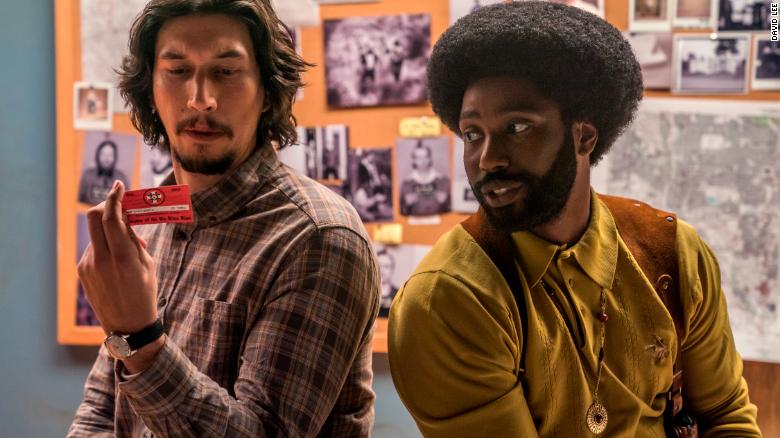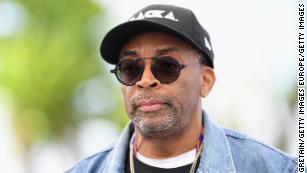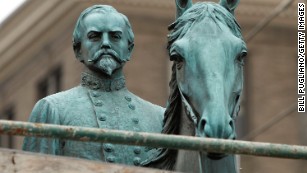How 'BlacKkKlansman' could help America write a new chapter
By Peniel JosephUpdated 5:28 PM ET, Thu August 9, 2018Peniel Joseph is the Barbara Jordan Chair in Ethics and Political Values and the founding director of the Center for the Study of Race and Democracy at the LBJ School of Public Affairs at the University of Texas at Austin, where he is also a professor of history. He is the author of several books, most recently "Stokely: A Life." The views expressed here are his. View more opinion articles on CNN.
(CNN)Spike Lee's brilliantly provocative film "BlacKkKlansman" (about the true story of a black undercover police officer who joins the Klan with the aid of a white colleague) opens wide on the first anniversary of Charlottesville as a pointed reminder of the long historical roots of our present racial drama. Peniel JosephLee's film reminds us of what side President Trump appealed to in Charlotte's aftermath by claiming a moral equivalency between anti-racist protesters and white supremacists marching in the usually bucolic college town. But the panoramic spectrum of rage unleashed in Charlottesville, Virginia, which left one person dead, far transcends the current White House occupant and his harmful bluster.America's contemporary political landscape makes watching "BlacKkKlansman" an especially poignant example of real life imitating an art form whose most enduring film (in this case D.W. Griffith's 1915 paean to the Klan "The Birth of a Nation") cast a national spell on America that we're still struggling to snap out of. Even more mesmerizing than racial hatred, the film suggests, is the banality of white supremacists outside the heroic cinematic representations that continue to linger in the American imagination. While "Gone With the Wind" and "The Birth of a Nation" evoke a romanticized version of racial privilege and black subordination, Lee's film reminds us that we must continue to wrestle with the ugly reality this lie is built on if we are to defeat the myths of racial superiority that offer ballast to white supremacists of all stripes.Charlottesville serves as a tipping point in the great American democratic experiment. It is no surprise that such a brazen display of white supremacy came less than a year after the 2016 presidential election. That campaign defied conventional notions that history, democracy and social justice all progress in a linear fashion -- the notion that tomorrow is destined to be better than yesterday. But enlightenment, historically, is, sadly, often forced through the crucible of violence, death and injustice.A year later, the United States is unmoored from longstanding political, philosophical and moral principles. America is lost, unbound from the historical, political and moral anchors that provided its robust sense of confidence, identity and destiny.One year after Charlottesville, America increasingly resembles itself at the beginning of the 20th century. Dark signs warn us of the risks of heading back toward the days when racial violence in the form of almost 4,000 lynchings, political corruption, the rise of the second Ku Klux Klan (founded in 1915), the segregation of the federal workforce (imposed by Woodrow Wilson in 1913) all thrived.The 20th century term "nativism" served as a polite description of racial, ethnic and religious xenophobia that comprised the underbelly of white supremacy. By 1924, federal immigration law placed strict quotas on legal migration and completely excluded those from certain continents, such as Asia. But the New Deal that rose, like a phoenix, from the ashes of the economic devastation of the Great Depression offered a new framework for American identity, one that at its best celebrated and affirmed the nation's racial, religious and ethnic diversity.What has been lost can be rediscovered. And to be sure, the New Deal consensus that soared so high for so much of the last century did so on the backs of millions of people of color and women who resided on the margins of liberal democracy's seeming egalitarian successes. The entire civil rights movement was premised on making the new American rhetoric of freedom and democracy match up to everyday reality. "The greatness of America lies in the right to protest for right!" Martin Luther King Jr. eloquently reminded us.The one-year anniversary of the white supremacist rally in Charlottesville offers the entire nation the opportunity and the duty to reflect on a tumultuous year of violence, racial hatred and the criminalization of difference that have become normal in American political culture. The normalization of racism in everyday life continues to accelerate nationwide. It has become an ordinary occurrence for white Americans to call the police on black Americans doing ordinary things: students, families who are barbecuing in a park, children selling water bottles, or consumers using coupons at pharmacies.Underneath this toxic racial divide is a longing among many Americans for a New Deal-type consensus around progressive ideals — absent some progressives' tragic commitment to white supremacy during the New Deal era, of course. We can see this in the growing number of young voters who, calling themselves democratic socialists, are supporting political candidates advocating free health care and college education for all Americans.Efforts to achieve this consensus around racial justice have happened before. Later social justice movements that remained rooted in the New Deal's vision of equality without its baggage of moral and political compromise offer perhaps the best way forward for American democracy. In the 1960s, amid painful racial division and the assassinations of John F. Kennedy and Martin Luther King Jr., a national consensus nonetheless emerged about the meaning of citizenship, democracy and America's global symbol as liberty's surest guardian. A new domestic consensus arose committed to equality and fair play that became codified into law in some of the landmark acts devoted to voting rights and fair housing. Movements advocating for the rights of women, Native Americans, Latinos, Asian Americans, and LGBTQ communities fundamentally transformed our national political, social and cultural landscape.Understanding the long view allows us to recognize Charlottesville as more than just a fever dream of racial hatred. It most certainly was that. The lighted tiki torches that substituted for the mid-20th century's burning crosses represent a national loss of consensus about racial justice as a core, foundational principal of American democracy, one that millions of people of all backgrounds have fought and died for at home and abroad. Yet that profound loss offers a generational opportunity for reimagining American democracy, citizenship, politics and morality.One year after Charlottesville, there continues to be, objectively, no moral equivalency between hate marchers and anti-racist activists. Yet, to our great moral shame and global embarrassment, we continue, as a nation, to behave as if there were.As a university professor, this past year wounded me both personally and professionally. The President's derogatory comments about nonwhite countries penetrated my intellectual armor as has the administration's callous policies toward Haiti, my parents' country of origin.As a lifetime student of American racial history, I have found the past year both painful and exhilarating. The latter emotion is especially apt for the historian, because the nation has repeatedly pulled itself back from the brink of self-destruction, exhibiting grace under pressure from both external and self-inflicted wounds. America's greatest generation lived, worked and died under racial slavery, having never achieved legal citizenship or freedom except, perhaps, in their hopes and dreams of a future without bondage.That undiscovered country of freedom, justice and equality for all Americans remains an unwritten chapter in our history. I profoundly hope that future histories will look to Charlottesville as providing the impetus for the further perfection of our union.
Peniel JosephLee's film reminds us of what side President Trump appealed to in Charlotte's aftermath by claiming a moral equivalency between anti-racist protesters and white supremacists marching in the usually bucolic college town. But the panoramic spectrum of rage unleashed in Charlottesville, Virginia, which left one person dead, far transcends the current White House occupant and his harmful bluster.America's contemporary political landscape makes watching "BlacKkKlansman" an especially poignant example of real life imitating an art form whose most enduring film (in this case D.W. Griffith's 1915 paean to the Klan "The Birth of a Nation") cast a national spell on America that we're still struggling to snap out of. Even more mesmerizing than racial hatred, the film suggests, is the banality of white supremacists outside the heroic cinematic representations that continue to linger in the American imagination. While "Gone With the Wind" and "The Birth of a Nation" evoke a romanticized version of racial privilege and black subordination, Lee's film reminds us that we must continue to wrestle with the ugly reality this lie is built on if we are to defeat the myths of racial superiority that offer ballast to white supremacists of all stripes.Charlottesville serves as a tipping point in the great American democratic experiment. It is no surprise that such a brazen display of white supremacy came less than a year after the 2016 presidential election. That campaign defied conventional notions that history, democracy and social justice all progress in a linear fashion -- the notion that tomorrow is destined to be better than yesterday. But enlightenment, historically, is, sadly, often forced through the crucible of violence, death and injustice.A year later, the United States is unmoored from longstanding political, philosophical and moral principles. America is lost, unbound from the historical, political and moral anchors that provided its robust sense of confidence, identity and destiny.One year after Charlottesville, America increasingly resembles itself at the beginning of the 20th century. Dark signs warn us of the risks of heading back toward the days when racial violence in the form of almost 4,000 lynchings, political corruption, the rise of the second Ku Klux Klan (founded in 1915), the segregation of the federal workforce (imposed by Woodrow Wilson in 1913) all thrived.The 20th century term "nativism" served as a polite description of racial, ethnic and religious xenophobia that comprised the underbelly of white supremacy. By 1924, federal immigration law placed strict quotas on legal migration and completely excluded those from certain continents, such as Asia. But the New Deal that rose, like a phoenix, from the ashes of the economic devastation of the Great Depression offered a new framework for American identity, one that at its best celebrated and affirmed the nation's racial, religious and ethnic diversity.What has been lost can be rediscovered. And to be sure, the New Deal consensus that soared so high for so much of the last century did so on the backs of millions of people of color and women who resided on the margins of liberal democracy's seeming egalitarian successes. The entire civil rights movement was premised on making the new American rhetoric of freedom and democracy match up to everyday reality. "The greatness of America lies in the right to protest for right!" Martin Luther King Jr. eloquently reminded us.The one-year anniversary of the white supremacist rally in Charlottesville offers the entire nation the opportunity and the duty to reflect on a tumultuous year of violence, racial hatred and the criminalization of difference that have become normal in American political culture. The normalization of racism in everyday life continues to accelerate nationwide. It has become an ordinary occurrence for white Americans to call the police on black Americans doing ordinary things: students, families who are barbecuing in a park, children selling water bottles, or consumers using coupons at pharmacies.Underneath this toxic racial divide is a longing among many Americans for a New Deal-type consensus around progressive ideals — absent some progressives' tragic commitment to white supremacy during the New Deal era, of course. We can see this in the growing number of young voters who, calling themselves democratic socialists, are supporting political candidates advocating free health care and college education for all Americans.Efforts to achieve this consensus around racial justice have happened before. Later social justice movements that remained rooted in the New Deal's vision of equality without its baggage of moral and political compromise offer perhaps the best way forward for American democracy. In the 1960s, amid painful racial division and the assassinations of John F. Kennedy and Martin Luther King Jr., a national consensus nonetheless emerged about the meaning of citizenship, democracy and America's global symbol as liberty's surest guardian. A new domestic consensus arose committed to equality and fair play that became codified into law in some of the landmark acts devoted to voting rights and fair housing. Movements advocating for the rights of women, Native Americans, Latinos, Asian Americans, and LGBTQ communities fundamentally transformed our national political, social and cultural landscape.Understanding the long view allows us to recognize Charlottesville as more than just a fever dream of racial hatred. It most certainly was that. The lighted tiki torches that substituted for the mid-20th century's burning crosses represent a national loss of consensus about racial justice as a core, foundational principal of American democracy, one that millions of people of all backgrounds have fought and died for at home and abroad. Yet that profound loss offers a generational opportunity for reimagining American democracy, citizenship, politics and morality.One year after Charlottesville, there continues to be, objectively, no moral equivalency between hate marchers and anti-racist activists. Yet, to our great moral shame and global embarrassment, we continue, as a nation, to behave as if there were.As a university professor, this past year wounded me both personally and professionally. The President's derogatory comments about nonwhite countries penetrated my intellectual armor as has the administration's callous policies toward Haiti, my parents' country of origin.As a lifetime student of American racial history, I have found the past year both painful and exhilarating. The latter emotion is especially apt for the historian, because the nation has repeatedly pulled itself back from the brink of self-destruction, exhibiting grace under pressure from both external and self-inflicted wounds. America's greatest generation lived, worked and died under racial slavery, having never achieved legal citizenship or freedom except, perhaps, in their hopes and dreams of a future without bondage.That undiscovered country of freedom, justice and equality for all Americans remains an unwritten chapter in our history. I profoundly hope that future histories will look to Charlottesville as providing the impetus for the further perfection of our union.
To the best of my ability I write about my experience of the Universe Past, Present and Future
Top 10 Posts This Month
- Here's how much ACA premiums would have risen this year without tax subsidies:
- Trump to make announcement with Hegseth on shipbuilding from Mar-a-Lago
- gold has surged 70% since the Start of the Year
- How the global food system is impacting obesity and climate change: Study
- Deputy AG says removing photos from Epstein files has 'nothing to do' with Trump(Sure thing) (ha ha)
- As storms inundated Washington state, federal grants for flood mitigation work sat on hold
- reprint of: My Path to Enlightenment from 2011
- Remembering the treasured films of Rob Reiner
- quote from Wikipedia: Mark Carney
- What is the main weakness of a Subaru 2017 PZEV engine: The Oil Seals and Gaskets. Why? (Part 2)
Subscribe to:
Post Comments (Atom)


















No comments:
Post a Comment